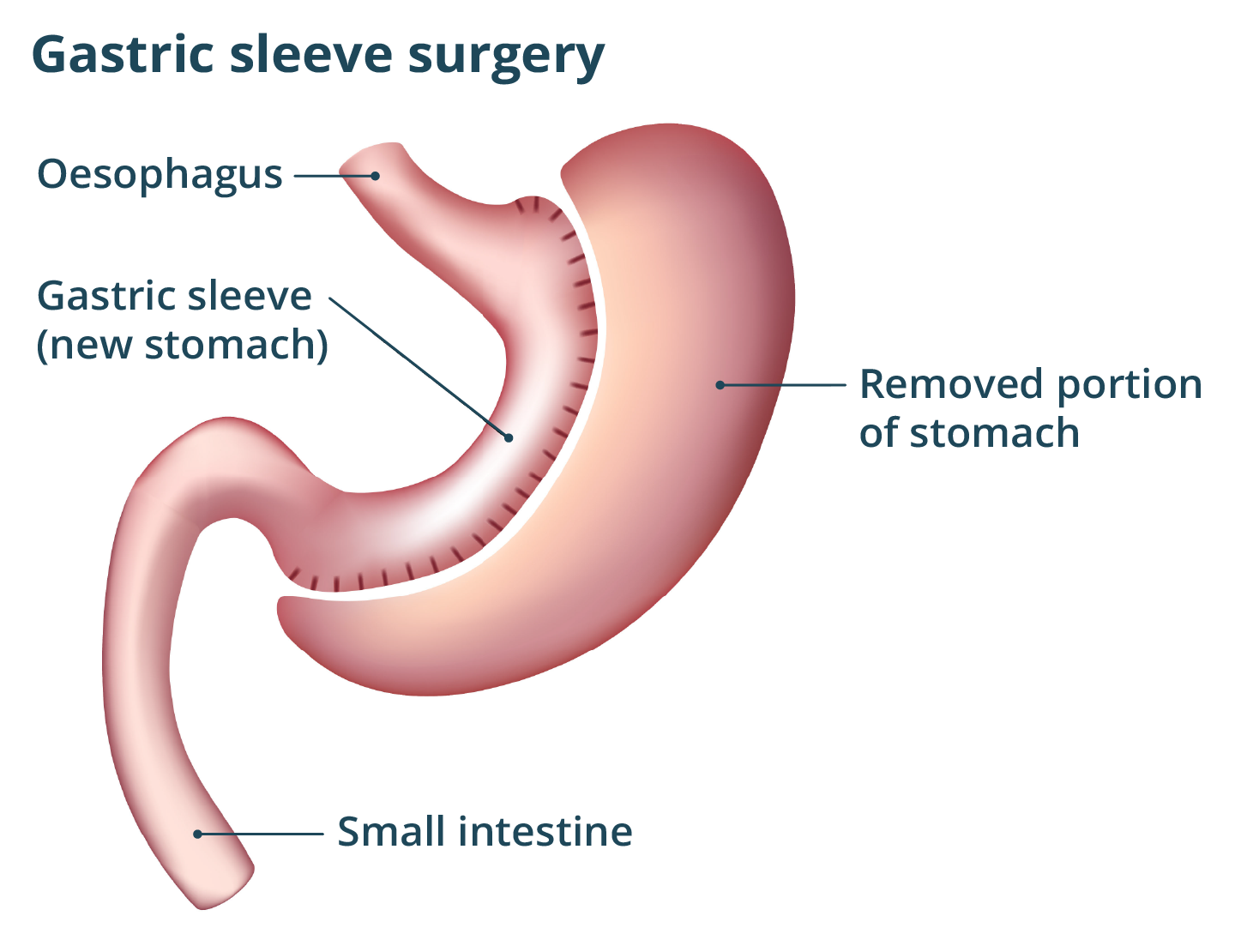Gastric sleeve surgery
Key facts
- Gastric sleeve surgery removes most of your stomach.
- This surgery helps people living with obesity lose weight and improve their health.
- It's commonly called a 'restrictive' procedure, as it restricts how much you can eat.
- After surgery you will need to follow a special diet, take vitamins and slowly increase your physical activity to lose weight and maintain weight loss.
What is gastric sleeve surgery?
Gastric sleeve surgery, also known as sleeve gastrectomy, is the most common type of bariatric surgery in Australia. It is surgery for weight loss that involves the removal of a large part of the stomach. After the surgery, you will feel full after eating a small amount of food.
The surgery also makes you feel less hungry, because a smaller stomach will produce lower levels the hormone ghrelin, which is responsible for the sensation of hunger.
Visit our guide to bariatric surgery to learn more about the different types of bariatric procedure.
What are the benefits of gastric sleeve surgery?
A sleeve gastrectomy has a lower risk of complications than a gastric bypass, another type of bariatric surgery. The type of bariatric surgery you are recommended depends on your health conditions and how much weight you are aiming to lose. You should speak with your doctor about what is best for you.
Losing weight after gastric sleeve surgery can help:
- control type 2 diabetes
- lower blood pressure
- improve heart health
- improve your quality of life
When might I consider gastric sleeve surgery?
You might consider gastric sleeve surgery if you have tried to lose weight by dieting and doing exercise and have not reached a healthy weight.
Bariatric surgery is usually recommended if other weight loss options are not successful.
Your doctor might suggest gastric sleeve surgery to help with weight loss if you have:
- a body mass index over 40
- a body mass index over 35 with other serious health problems like diabetes or heart disease
How do I prepare for gastric sleeve surgery?
If you are considering surgery, your doctor will refer you for tests to make sure that gastric sleeve surgery is right for you. You may be asked to attend an information session to learn more about the surgery and what to expect afterwards.
Smoking affects your recovery after surgery and can increase your risk of experiencing complications. If you are a smoker, it's strongly recommended to quit at least 6 weeks before you have gastric sleeve surgery.
To lower your risk of complications, it's recommended to eat a very limited diet for several weeks before having surgery. Your doctor will tell you more about any changes you need to make to medicines and your diet in the weeks or days before surgery.
What can I expect during gastric sleeve surgery?
Gastric sleeve surgery is performed under a general anaesthetic. It is usually done by keyhole (laparoscopic) surgery and takes 60 to 90 minutes.
The surgeon will use a stapling device to create a small tube ('sleeve') in the stomach, and then remove the rest of the stomach.

What can I expect after the procedure?
Most people stay in hospital for 2 to 3 days after gastric sleeve surgery. You might need to take pain medicine for a short time after the surgery and you will be advised not to drive.
After gastric sleeve surgery, you will first start with liquid foods. You will then gradually transition to pureed food and then solids after a few weeks. Your meals will be much smaller and you may have to stop drinking with meals due to your small stomach.
A dietitian will advise you on how you can change your eating habits after gastric bypass surgery to keep healthy while losing weight. Physical activity is also important after gastric bypass surgery. A physiotherapist can guide you how to gradually build up your level of exercise.
You might find that you initially lose weight, but then your body becomes used to the changes made during the surgery. To maintain weight loss in the long term, it's important to follow your healthcare team's advice and discuss any concerns.
You will need regular health checks and blood tests following surgery. You will also need to take vitamin and mineral supplements for the rest of your life.
If you take medicines, they may need to be adjusted after surgery, so be sure to see your doctor regularly.
What are the risks of gastric sleeve surgery?
Risk of gastric sleeve surgery can include:
- bleeding
- leakage of fluid from the stomach
- infection
- the sleeve expanding over time
- nutrient and vitamin deficiency
You should talk to your doctor about the risks of the procedure.
Resources and support
Speak to your doctor if you have any questions about your weight or if you are interested in finding out about gastric sleeve surgery.
You can also call the healthdirect helpline on 1800 022 222 (known as NURSE-ON-CALL in Victoria). A registered nurse is available 24 hours a day, 7 days a week.
The Australian dietary guidelines can help you find healthy eating tips for both before and after surgery.
For help to quit smoking call Quitline on 13 7848 (13QUIT). Hours of service my vary between states and territories, you can check the website for details or request a call back.
Do you prefer to read in languages other than English?
You can also find information on smoking cessation and healthy eating on the Health Translations or Multicultural Health Communication Service websites for resources in languages other than English.
Looking for information for Aboriginal and/or Torres Strait Islander people?
Aboriginal Quitline is staffed by Aboriginal counsellors. You can call them on 13 7848 if you need help to quit smoking.
Learn more here about the development and quality assurance of healthdirect content.
Last reviewed: February 2024











